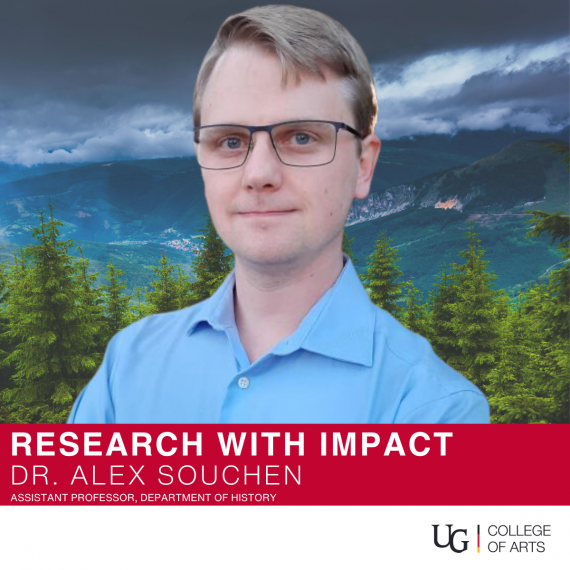History Prof. Studies the History of Science, Environment and Technology's Impact on the Natural World

Dr. Alex Souchen, assistant professor in the Department of History in the College of Arts at the University of Guelph, is an esteemed faculty member recognized for his expertise in history and environmental studies. Through his role, Souchen is deeply engaged in teaching and research endeavors, aiming to uncover the intricate relationship between human history and the natural world. During an interview with the College of Arts’ Marketing and Communications team, he described his work as "interdisciplinary research that generally all exists at the intersection of military history, the history of science and technology, environmental history, and Canadian history."
Souchen has taught fourth-year Environmental History classes that revolved around the global history of climate change and integrated his vast environmental history research, which was inspired by his interest in the Second World War and its impact on the environment. Souchen emphasized the importance of connecting the past to present-day ecological issues and remarked that his interest in the Second World War and its environmental impact prompted him to examine how that conflict contributed to our current ecological crisis and the climate crisis. He reflected that, while the Second World War revolutionized aircraft, aircraft are key emitters of carbon dioxide and other harmful emissions today. He then explained that the production of plastics, whose negative effects on humans and the environment are ever-present and wide-ranging, began in the Second World War with the loss of natural rubber resources after the Allied defeat at Singapore in 1942.
He later explored another detrimental after-effect of the Second World War on the environment when he discussed the disposal of ammunitions following the conflict. "You have to destroy all of the assets that caused the war and that has a consequence, right? Whether you’re burning them on land, you’re blowing them up, just throwing [them] in the ocean - no matter what you do, you are [going to] cause some type of pollution.” Souchen explained that he has conducted much research on the rationale behind ammunition disposal practices proceeding the First and Second World Wars and found that scientists at the time approved of these destructive practices that affect the current state of the world. Reflecting on the detrimental effects of these actions, he explained “[Trinitrotoluene, or TNT, is] getting into the fish [that we eat and there are] a lot of problems because TNT is a potential carcinogenic.”
While the topics Souchen explores in his teaching are often dismal, he shared that he places much emphasis on hope and encourages students to translate their learning into meaningful action in the context of environmental sustainability. A main project he assigned to students in a fourth-year Arts and Sciences class he taught, he explained, consisted of assigning specific sectors (e.g., municipal, agricultural) to respective teams and tasking the teams with researching solutions that would render that sector more environmentally friendly. He tailors his assignments in such a way that students leave with a sense of optimism and an understanding that their actions can contribute to positive change. He lauded the students he teaches as "a great and engaged group of people” and shared that he finds it inspiring to help them on their learning journeys in different ways. Through mentorship and engaging discussions, Souchen equips students with the knowledge and motivation to address pressing environmental issues and advocate for a greener future.